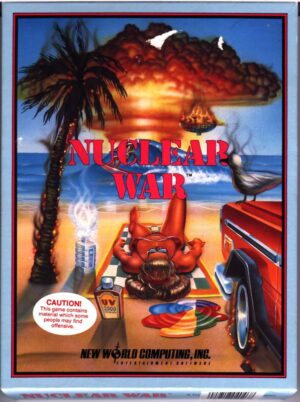Retro Replay Review
Gameplay
Vision: The 5 Dimension Utopia places you in the role of a newcomer to a colossal arcology floating on the open sea. Right from the start, the game’s resource-management loop—balancing work, food, rest, and rent—anchors your day-to-day decisions. You’ll find yourself juggling meter bars for health and stamina as you tackle mini-games that range from timed repairs on the arcology’s infrastructure to quick-reaction rescue missions. This blend of light simulation and action segments keeps the core gameplay loop moving at a brisk pace.
(HEY YOU!! We hope you enjoy! We try not to run ads. So basically, this is a very expensive hobby running this site. Please consider joining us for updates, forums, and more. Network w/ us to make some cash or friends while retro gaming, and you can win some free retro games for posting. Okay, carry on 👍)
The mini-games serve as the primary avenue for earning credits, and they’re surprisingly varied for an advertising-driven title. Some tasks challenge your reflexes with fast-paced button sequences, while others ask you to plan routes or optimize resource use in a grid-based repair scenario. Completing these tasks not only funds your rent and meals but also occasionally unlocks small narrative beats, giving a sense of progression beyond simple score thresholds.
While the variety is a strength, repetition can set in after extended sessions. Many of the tasks reuse mechanics with slight cosmetic tweaks, and without a deeper skill tree or customization options, experienced players may find the challenge caps out quickly. However, quick load times, responsive controls, and a clear HUD let you jump right back into action, making it easy to pick up where you left off—even if the novelty wears off after a dozen hours.
Graphics
The visual presentation of Vision: The 5 Dimension Utopia leans into a bright, optimistic palette befitting an idealized floating city. The arcology’s modules are rendered in clean, minimalistic 3D geometry with crisp edges and a slightly stylized aesthetic. You’ll traverse communal plazas, hydroponic farms, and residential pods that share a cohesive design language, emphasizing both futuristic technology and human comfort.
Despite its modest budget, the game delivers smooth animations for character movements and environmental interactions. Mini-games often shift camera angles or utilize simple particle effects—sparks when welding metal plates, water sprays during maintenance tasks—to heighten the sense of urgency. Frame rates remain stable even when multiple effects coincide, though higher-end GPUs will notice the lack of advanced post-processing or ray-traced shadows.
UI elements are cleanly integrated, with translucent menus and clearly labeled meters for health, energy, and credits. Portraits of NPCs convey personality with expressive 2D illustrations, and tooltip pop-ups guide you through new mechanics without interrupting the flow. While not a showcase for photorealism, the overall art direction supports the utopian theme and helps maintain immersion in the floating metropolis.
Story
At its core, Vision: The 5 Dimension Utopia is a promotional piece for a German building society, but it still weaves a light narrative of community and personal responsibility. You arrive as a fresh face in the city and are guided by a cast of supportive NPCs—mentors, neighbors, and fellow workers—each offering incremental tasks that tie into the broader plot: ensuring the arcology’s sustainability and harmony.
Story beats play out between work shifts, delivered via short dialogue sequences and journal entries. Tasks double as quests, from stabilizing the hydroponic bays during a nutrient shortage to rescuing a trapped technician during a system failure. These set-pieces provide context for the mini-games and reinforce the idea that your labor directly benefits the community, though the narrative rarely ventures into conflict or deep character arcs.
For gamers seeking a rich, character-driven tale, the plot may feel serviceable at best. However, as an interactive advertisement, the narrative effectively underscores themes of homeownership, community investment, and the rewards of steady work. It doesn’t overwhelm you with lore, and its optimistic tone keeps the pace light, making it suitable for short play sessions or casual afternoons.
Overall Experience
Vision: The 5 Dimension Utopia succeeds as a focused, bite-sized simulation that blends light action with resource management. Its easy learning curve and quick mission cycles make it approachable for players of all skill levels, while the bright visuals and upbeat narrative sustain a pleasant atmosphere. If you’re drawn to tidy mini-games and a neat progress loop, this title will scratch that itch without demanding marathon play sessions.
On the flip side, the advertising origins show in the game’s limited scope and lack of deeper customization or emergent gameplay. Once you’ve cycled through each mini-game variant a few times, the novelty diminishes. Hardcore simulation fans might miss more complex city-building elements, and narrative enthusiasts may long for richer character development. Yet as a free—or very low-cost—download available at LBS branches, the value proposition remains strong.
In summary, Vision: The 5 Dimension Utopia offers an engaging diversion that ties its mechanics neatly into a light promotional narrative. While it won’t replace heavyweight simulations or blockbuster action titles, it delivers approachable gameplay, solid performance, and a positive, community-focused message. For potential buyers curious about casual simulation with a futuristic twist, this floating arcology adventure is well worth exploring.
 Retro Replay Retro Replay gaming reviews, news, emulation, geek stuff and more!
Retro Replay Retro Replay gaming reviews, news, emulation, geek stuff and more!









Reviews
There are no reviews yet.